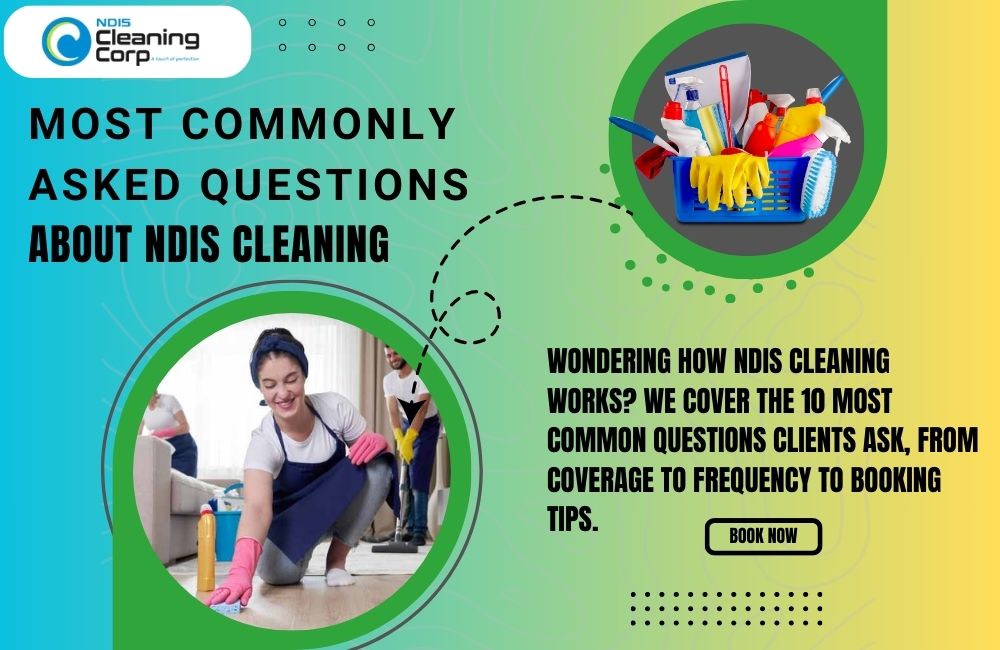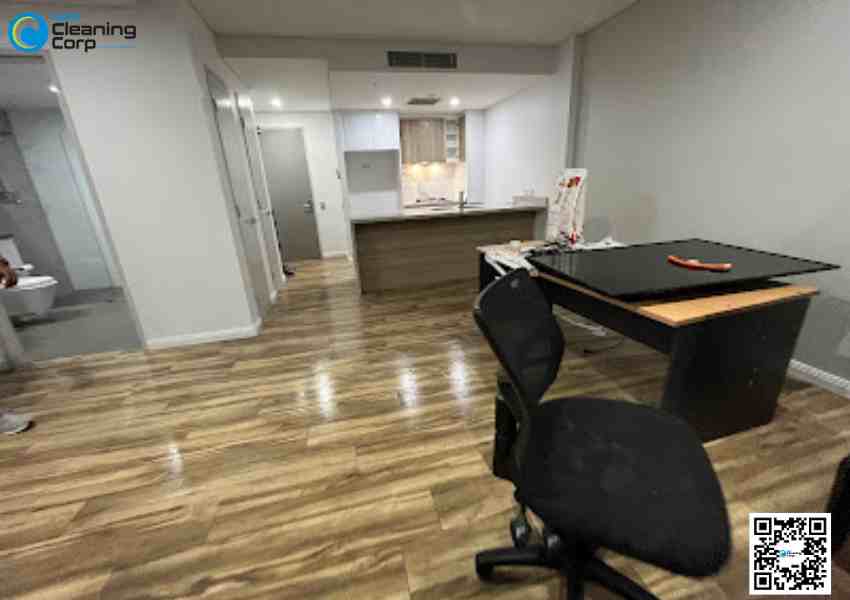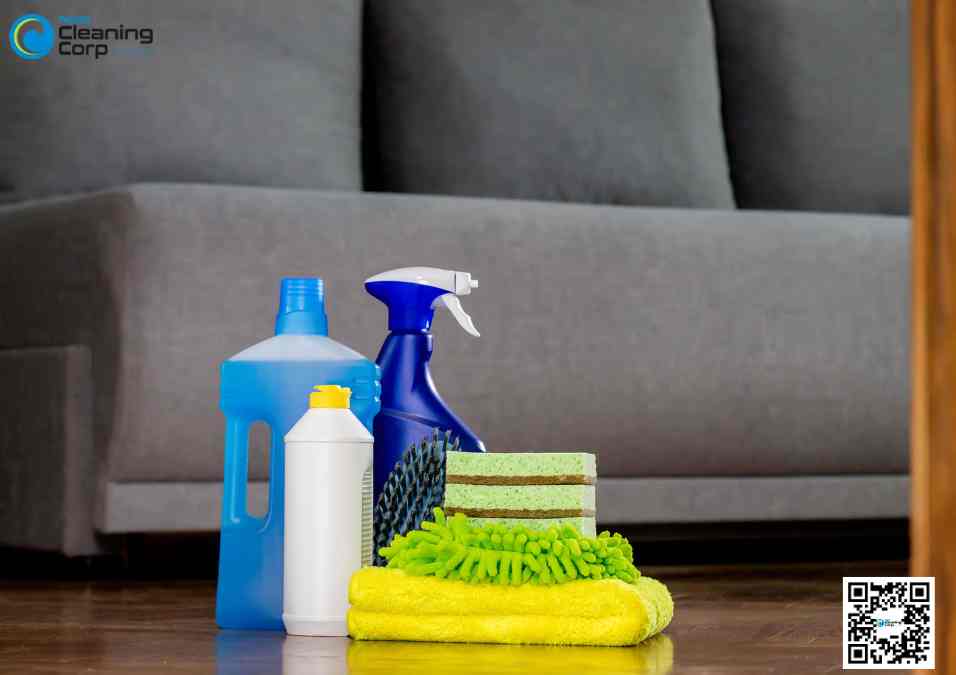Does the NDIS Fund Cleaning Services?
Yes. The NDIS does fund cleaning services — but it...
Coordinating your NDIS cleaning services with other support providers can transform how effectively you manage your care and services.
When everything falls into place—when your cleaning team, healthcare providers, and other support workers are all on the same page—it brings a huge difference to your daily life. Instead of having to chase down providers or juggle different schedules, coordination helps everything flow more smoothly. Imagine coming home after a physical therapy session to a clean, freshly sanitized environment that makes it easier to relax, recover, and enjoy your day.
The benefits of coordinating your NDIS cleaning with other services go beyond just convenience. It means you can simplify your schedule, minimize disruptions, and make sure your home environment supports your health and wellbeing. For instance, if you have physical support needs, having a clean, well-organized space can make all the difference in maintaining mobility and preventing injuries. By integrating your cleaning services with other supports, you’re setting yourself up for a cleaner, healthier, and more manageable lifestyle.
In this post, we’ll walk you through why coordination is so essential, practical ways to make it happen, and some real-life scenarios where coordination has made a big impact. These steps aren’t just ideas—they’re realistic, actionable strategies that we see work for NDIS participants every day.

When your cleaning service and other providers work together, it brings a level of consistency that can truly improve your day-to-day routine. Let’s say you rely on support workers to assist with mobility or health needs. Having your cleaning services scheduled to align with your support staff means there’s no need to shuffle appointments or worry about service overlaps. Instead, you’ll enjoy a cleaner, safer space at exactly the times you need it most, without service disruptions or the frustration of changing schedules.
For example, suppose you have regular physical therapy sessions that leave you feeling exhausted afterwards. Imagine if your cleaning team could come in shortly after to freshen up the space and create a comfortable environment for recovery. This way, your support providers aren’t stepping on each other’s toes, and your time is used in the best way possible. This type of efficiency isn’t just convenient—it also helps you stay focused on your health and daily goals.
A big part of effective NDIS planning is getting the most out of your funding, and coordinating your services is one of the best ways to do it. When you’re able to bundle services or strategically schedule them, you’re often able to save money and resources.
For instance, by coordinating cleaning services with other providers—say, combining cleaning with meal preparation or personal care services on the same day—you might reduce the number of visits required from each provider, which ultimately conserves your budget. Even small adjustments like these can make your funding go further and leave more flexibility for other essential services or support you may want to add.
Consider a participant who needs regular help with both cleaning and personal care. By scheduling both services on the same day, with time in between for each provider to complete their tasks, you’re able to minimize travel costs and the need for separate visits. This coordination leads to a more streamlined, less costly approach to NDIS services without compromising the quality of support.
There’s no question that managing multiple providers and schedules can be overwhelming. A coordinated service plan takes a lot of the stress out of the equation, not only for you as the participant but for your entire support network.
When your NDIS cleaning services are carefully coordinated with other support providers, communication becomes a lot simpler. You won’t have to worry about relaying information back and forth between different providers or checking in constantly to make sure everyone knows the plan. Instead, your care plan can work like a well-oiled machine, giving you peace of mind and helping your support team work more effectively.
Imagine a scenario where you need assistance with both meal preparation and cleaning on the same day. By coordinating these services, your support team can communicate more easily, prioritize tasks, and provide care in a logical sequence. For you, it means knowing that everything is taken care of in a way that makes your life easier, reducing the mental load and allowing you to focus on what really matters.
The first step is knowing what you need from your cleaning and other support services. Take a moment to think about what’s essential to your daily routine and what makes a difference in your quality of life.
For instance, if you need assistance with specific health requirements, like maintaining a sanitary environment due to compromised immune systems, cleaning becomes a priority. On the other hand, if you have mobility limitations, arranging for regular decluttering or rearranging of your space can be critical for accessibility and safety.
This is also a good time to make a list of the support services you rely on most, whether it’s for personal care, health, or meal assistance, and think about how each could be enhanced by a clean and organized environment.
Now that you know your core needs, it’s time to think about how these services can fit together in a practical way. Collaborative scheduling is key here. The goal is to find a rhythm that works with your lifestyle and preferences, while also being mindful of the needs of each provider.
A practical example would be aligning cleaning with any healthcare visits that may leave you needing a peaceful, fresh space afterward. Say you have a nurse visit once a week; having a cleaning session scheduled immediately afterward can allow you to recover in comfort. Or, if you receive physical support, scheduling a cleaning service just before your physiotherapist visits can ensure a clear and safe area for any exercises or mobility work.
Clear communication is essential to avoid misunderstandings and make sure everyone is on the same page. The more open and clear you are with each provider, the smoother things will run. Let your providers know who else you work with and, if possible, set up a shared communication channel that works for everyone involved.
For instance, you could start a weekly email that goes out to all your providers, outlining any updates, schedule changes, or specific needs for the week. This can keep everyone informed and help you feel in control of your care.
If coordinating services on your own sounds overwhelming, consider working with an NDIS Support Coordinator. Their job is to help you get the most out of your NDIS plan, which includes helping you organize and align your services.
A support coordinator can work with your NDIS cleaning provider and other support services to make sure everything flows well and aligns with your goals. They’re especially helpful if you have a lot of providers, as they can help manage communications, scheduling, and any budget concerns to make your care plan as effective as possible.
Let’s say there’s a participant named Sarah who has mobility issues and requires both regular physiotherapy and a clean, accessible environment to prevent fall risks. To make her care as effective as possible, Sarah’s support coordinator schedules her cleaning services to take place right before her weekly physiotherapy sessions.
This scheduling means that Sarah’s living space is clean, safe, and free of clutter every time her physiotherapist arrives, allowing them to focus fully on her mobility exercises. The cleaner can ensure pathways are clear and sanitize high-touch surfaces, creating an ideal environment that reduces risks of falls or injuries.
For Sarah, the benefits are clear: her home is always ready for her healthcare appointments, which keeps her focused on her goals. This example shows how coordinating NDIS cleaning services with healthcare providers leads to better outcomes, a safer environment, and peace of mind for both the participant and her support team.
When working with multiple NDIS providers, setting clear boundaries and expectations with each one can make all the difference. From experience, I’ve seen how much smoother things run when everyone knows exactly what they’re responsible for. It’s not just about defining tasks, though—it’s about making sure each provider respects the roles of others, so you don’t have overlapping responsibilities or misunderstandings.
For instance, if your cleaning provider knows they’re responsible for keeping all surfaces clean and sanitized but not for tidying up personal belongings, it creates a clear understanding of what you can expect from them each visit. This level of clarity keeps your home as you need it, without confusion or stepping on toes.
On a personal note, I worked with a participant who had multiple providers coming in throughout the week—healthcare, personal care, and, of course, our cleaning team. Once we all met to talk through our roles and scheduled tasks, the atmosphere just became so much more organized. And for the participant, it meant less stress. She didn’t have to constantly explain her needs or worry about one provider interrupting another’s work. Instead, she could rely on each of us to do our part, knowing we all understood our place in her support system.
These kinds of boundaries keep things professional and ensure that everyone involved knows the participant’s priorities. Plus, it’s much less stressful for participants and caregivers alike to work with a team that’s cohesive and respectful of each other’s contributions.
Flexibility is key when it comes to NDIS support because needs change over time. We often start with a set schedule, but as circumstances shift, it’s important to revisit and adapt as needed. I can’t tell you how many times we’ve adjusted a cleaning plan to better suit someone’s evolving requirements, whether it’s due to a change in their health, a new provider coming on board, or simply learning what works best.
One participant we work with began her service with cleaning every other week, but after a few months, she noticed she needed more frequent assistance due to increased mobility limitations. We shifted her schedule to weekly cleanings, and it was a game-changer. Her home was easier to navigate and cleaner, which meant fewer risks of tripping or slipping. It’s little changes like these that can have a big impact.
So, if you’re a participant or a caregiver, don’t hesitate to adjust things when necessary. The schedule isn’t set in stone, and regular check-ins with your providers can ensure that your support aligns with what you need at any given time. Just remember, your NDIS team is there to support you, and they’re typically more than willing to accommodate shifts to better suit your lifestyle and wellbeing.
What are the benefits of coordinating cleaning services with other support providers?
Coordinating your cleaning services with other support providers brings several advantages. It’s not just about convenience—it’s about creating a safer, more efficient living space. When cleaning is aligned with other services, you reduce service overlaps, which can save time and even reduce stress. A cleaner environment also directly supports your health goals, especially if you have specific needs like infection control or need a clutter-free space for mobility.
For example, when cleaning is coordinated around healthcare visits, it means you come home to a clean, comfortable environment after a session, which aids in recovery and peace of mind.
How can I communicate effectively with multiple NDIS support providers?
Good communication is essential when you have several providers involved in your NDIS plan. Start by establishing a communication routine that works for you—some people use weekly emails or a shared notebook, where each provider can check in and share updates. This ensures everyone is on the same page and prevents gaps in support.
You can also arrange for regular check-ins, even if brief, with each provider to update them on any changes in your routine or new priorities you may have. This way, they can adjust their services to best meet your needs without guesswork.
Is it possible to bundle NDIS services to save on costs?
Yes, in many cases, you can bundle NDIS services to make the most of your funding. Some NDIS plans support bundled services, allowing you to combine support types to reduce costs and maximize your budget. For example, if you can schedule personal care and cleaning services on the same day, you can sometimes save on travel or service costs. By combining services thoughtfully, you can free up funds for other support areas that may be important.
Who can help me organize my NDIS services and schedules?
An NDIS Support Coordinator is a fantastic resource for anyone feeling overwhelmed by organizing multiple services. They’re experienced in helping participants manage complex support needs, coordinating schedules, and even addressing any funding questions you may have. Your support coordinator can act as a central point for communication between providers, so you don’t have to manage everything alone. Many participants find that working with a coordinator helps them make the most of their NDIS plans with less stress and greater peace of mind.
Coordinating your NDIS services can feel like a lot of work, but it’s well worth the effort to create a seamless, supportive environment. When you take the time to align your cleaning services with other providers, you’re not just making things easier for yourself—you’re setting up a system that supports your health, safety, and overall wellbeing. A well-coordinated plan can mean less time managing schedules and more time enjoying a safe, clean home.
At the end of the day, coordination is about enhancing your quality of life. By organizing your NDIS cleaning with other supports, you’re taking a proactive step toward a more comfortable, supportive living space. Whether you’re a participant or a caregiver, embracing coordinated care can truly make a difference in your daily routine and long-term wellbeing.

Yes. The NDIS does fund cleaning services — but it...

Alright, let’s get straight into it. These are the questions...

NDIS cleaning services are specifically designed to cater to the...

The role of professional cleaning in maintaining a safe and...

Studies consistently show that living in a clutter-free, organized space...